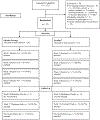An Open-label Pilot Study of NicoBloc as a Novel Smoking Cessation Intervention
- PMID: 37579108
- PMCID: PMC10480353
- DOI: 10.1097/ADM.0000000000001157
An Open-label Pilot Study of NicoBloc as a Novel Smoking Cessation Intervention
Abstract
Introduction: NicoBloc is a viscous fluid applied to the cigarette filter designed to block tar and nicotine. This novel and understudied smoking cessation device presents a nonpharmacological means for smokers to gradually reduce nicotine and tar content while continuing to smoke their preferred brand of cigarette. This pilot study aimed to assess the feasibility, acceptability, and initial efficacy of NicoBloc as compared with nicotine replacement therapy (nicotine lozenge).
Methods: A community sample of predominately Black smokers (N = 45; 66.7% Black) were randomized to receive NicoBloc or nicotine lozenge. Both groups engaged in 4 weeks of smoking cessation therapy followed by 2 months of independent usage with monthly check-ins to assess medication adherence. The intervention lasted 12 weeks, and the study concluded with a 1-month postintervention follow-up visit (week 16).
Results: NicoBloc was comparable with nicotine lozenge in smoking reduction, feasibility, symptom adverse effects, and reported acceptability at week 16. Participants in the lozenge group endorsed higher treatment satisfaction ratings during the intervention and lower cigarette dependence. Adherence to NicoBloc was superior throughout the study.
Conclusion: NicoBloc was feasible and acceptable to community smokers. NicoBloc presents a unique, nonpharmacological intervention. Future research is needed to examine whether this intervention may be most effective in subpopulations where pharmacological approaches are restricted or in combination with established pharmacological methods such as nicotine replacement therapy.
Trial registration: ClinicalTrials.gov NCT03720899.
Copyright © 2023 American Society of Addiction Medicine.
Conflict of interest statement
The authors report no conflicts of interest.
References
-
- Mills EJ, Wu P, Lockhart I, Wilson K, Ebbert JO. Adverse events associated with nicotine replacement therapy (NRT) for smoking cessation. A systematic review and meta-analysis of one hundred and twenty studies involving 177,390 individuals. Tob Induc Dis. Jul 13 2010;8(1):8. doi: 10.1186/1617-9625-8-8 - DOI - PMC - PubMed
-
- Rankin KV, Jones DL. Chapter 17 - Prevention Strategies for Oral Cancer. In: Cappelli DP, Mobley CC, eds. Prevention in Clinical Oral Health Care. Mosby; 2008:230–243.


